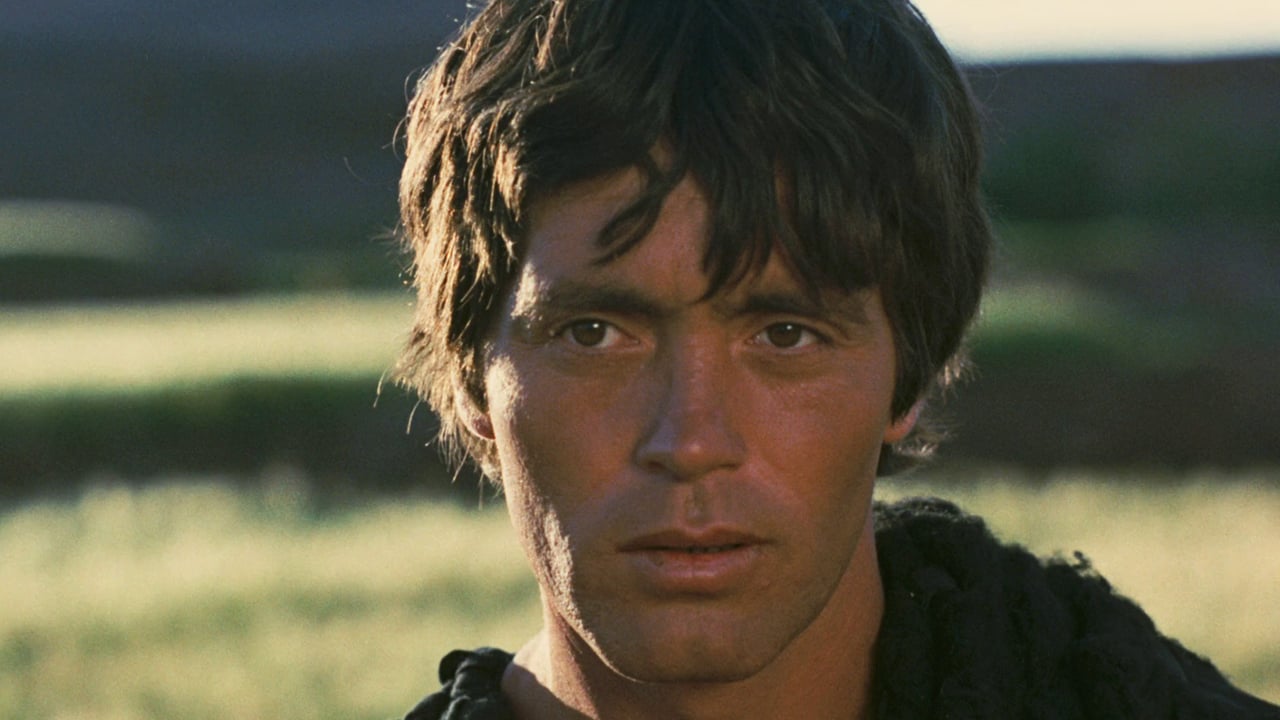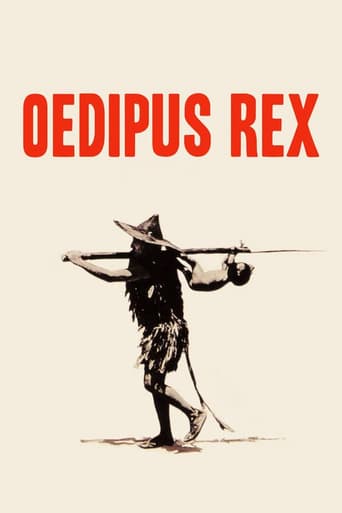

Pretty Good
... View MoreIt's the kind of movie you'll want to see a second time with someone who hasn't seen it yet, to remember what it was like to watch it for the first time.
... View MoreOne of the worst ways to make a cult movie is to set out to make a cult movie.
... View MoreI didn’t really have many expectations going into the movie (good or bad), but I actually really enjoyed it. I really liked the characters and the banter between them.
... View MoreLike in other Pasolini movies, we have here two parallel told stories: There is a first "Oedipus", in the 20ies of the 20th century, a baby is nursed by his beautiful mother, sitting on a meadow. His father is afraid that the baby will steal his love. Then there is the second "Oedipus", based on Sophocles, but very freely interpreted by Pasolini, both what concerns the landscape (Southern Italy, Maroque) and the costumes, as well as the original texts (Pasolini shows parts of "Oedipus on Kolonos"). Otherwise, we are told here the mystic story of Oedipus, who is left by his parents, grows up with the king of Korinthos, gets to kill his father and to marry his mother, being fully unaware of what he is doing: he is doomed. At the end, the first Oedipus is coming back: As a blind beggar (the mystic Oedipus was blinded on his own wish) he sits in front of the cathedral of Bologna, is accompanied by a young boy and seeks that meadow where the movie started."Edipo Re" (1967) is one of those films by P.P. Pasolin about which we have extensive comments by the author and film director. Pasolini considered this film autobiographic, being himself that baby on that meadow suckling the milk from his beautiful mother's breast and causing unintentionally his fascist-fathers hatred. He made himself responsible for the death of him whom he loved and hated at the same time. Also, in this picture, there is the complicated relationship of the gay-man towards his mother which Pasolini called "latent". Pasolini wrote that he intended a completely metaphorical and mysticized autobiography, but instead of projecting the myth onto psychoanalysis, he would project psychoanalysis on the myth. So, there is only to say that we know Pasolini's mother Susanna from several of her son's movies in which she played minor, but often crucial roles - in the "Gospel according to St. Matthew" she was the old Marie ... .
... View MoreI believe this movie, Edipo Re, to be the worst movie Pasolini ever made. I kind of like his other films, but this one is unbelievable. As already said, the characters speak their lines as if they were on a stage, trying to give it too much of a feeling and effect, making the dialogues and Oedipus' monologues especially, very annoying to me. Sometimes the actors tried too hard and sometimes they seemed as if they were just cold machines with no feelings at all. And the fact, that half of the time someone, but mostly Oedipus is screaming as if they would torture him, was extremely disturbing me. Actually the first time I watched it, I had to stop it somewhere in the half of the movie. I finished it only a bit later. The actors' performances were under my opinion weak. It may surprise you all, but I give it just 2 stars meaning "very weak" and that only because it carries the name Pier Paolo Pasolini. If it would be someone else's movie and if it would be possible on this site I'd give it a straight 0, what would mean "totally dreadful".
... View MoreThis film is possibly the most brilliant - color - film AS ART that I I have ever seen. It combines beautiful and fascinating poetic color visuals, unusual landscapes and locations with the classic story of Oedipus.The story is told with very little dialog, (subtitles for the dialog where present) and this enhances the internal, primal feeling of the piece. Pasolini was often compared to Fellini, but I feel he is much better, because he uses his visuals always to advance and to the purpose of the story. To me Fellini's visuals were often purposeless antic oddity. Here, any ambiguity is not in the story, but in character motivation, which lends modern reality and immediacy to the whole.The acting style combines the classic Greek use of stylized mannerisms and mask work seamlessly with smaller modern film acting. The setting transitions from 1960s Italy to a primitive/tribal landscape which lends itself beautifully to the timeless/ancient feeling of the Greek story. An example of detail: tribal body painting is used to represent both a ritual queen in shades of Elizabeth R, to the whiteness of a plague death; the costume designs are a combination of rustic and Egyptian/Papal religious.Cast mainly with little known actors, the big name actor in this film was international star Alida Valli, who has only two or three brief scenes. Her talent is fairly wasted here, but her presence is riveting as the aging, childless queen. (Valli: A brilliant Italian actress who had a brief career here in the 40s-50s, then returned to Italy/Europe, and balanced her commercial work in slashers with more oddball artistically challenging work. Her work often embodies "excess within control," the dichotomy of superficial clam with seething internal emotion. PARADINE CASE, THE THIRD MAN, THE MIRACLE OF THE BELLS, CASSANDRA CROSSING, EYES WITHOUT A FACE, SENSO, WALK SOFTLY STRANGER.) This film is the kind of work I would hope to be a part of as an actress and artist. This film could easily be in theatres today and be even more appreciated now than it was at the time of its making.Theatrically literate, visually stunning, gutsy, and intelligent. Enjoy!
... View MoreWe do ourselves no favour by fixating on how well a film uses every little detail and line in an original text. Certainly, by those standards this is a mediocre, and possibly lazy, film at best. But at the same time there is the problem of being so liberal in one's adaptation that every goes sour, the latest attempt at "Vanity Fair" is a perfect example. But this film, along with Bresson's "Pickpocket," should stand as the rules of adaptation for every young director. Both films are very interpretative, but the directors aren't so naive as to think that mere plot details can constitute a film. So what pushes this film beyond a mere surface-level adaptation? In this case, it takes a deep insight into the nature of Greek tragedy itself. Tragedy's dualism (the representational and the chaotic) is prevalent in all Pasolini's works, it was especially essential in his "Gospel," and I was excited to see how it played out in its own source, and the results are absolutely fantastic. Visually imaginative and so intellectually superior to its contemporaries it seems out of place in film.5 out of 5 - Essential
... View More